- Author Adrian Jeff jeff@psychologosportal.com.
- Public 2023-12-17 05:06.
- Last modified 2025-01-24 14:09.
Marina Tsvetaeva. My hour with you is over, my eternity remains with you. Part 1
The life and work of Marina Tsvetaeva is a vivid systemic example of a person's life scenario with a combination of two dominant vectors - urethral and sound. Mozart and Pushkin, Yesenin and Vysotsky, Mayakovsky and Christ, Blok and Tsvetaeva. Combining the incompatible in their psychic, these people at various degrees of complexity lived out their life "scenario for death" …
To love is to see a person as God intended
and the parents did not.
Marina Tsvetaeva
Instead of a preface
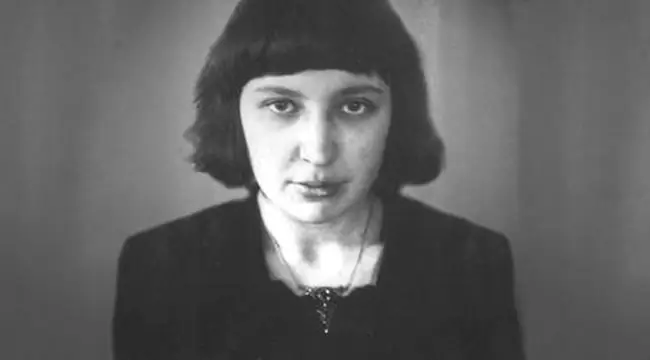
The life and work of Marina Tsvetaeva is a vivid systemic example of a person's life scenario with a combination of two dominant vectors - urethral and sound. Mozart and Pushkin, Yesenin and Vysotsky, Mayakovsky and Christ, Blok and Tsvetaeva. Combining the incompatible in their psychic, these people, at various degrees of complexity, lived their life "scenario of death", laid hands on themselves, not having time to understand what had happened, or unconsciously took a mortal risk.
***
The news of Leo Tolstoy's death rocked Moscow. People gathered in crowds, shouting "Down with the death penalty!" and whispered that the Cossacks had been expelled to disperse. The desire to go to the funeral of the great writer seemed so natural, but the father categorically forbade the girls to leave the house. Riots are possible. For the eldest, her father's prohibition meant nothing. The youngest was ready to follow her sister into fire and water. After waiting for her father to hide in his office, Marina rushed to the door with lightning. Asya jumped out into the cold in her shoes - empty, the main thing is not to lag behind her sister.
Having procured thirty rubles from friends, the girls miraculously took a train ticket to the station of Kozlov Zaseka near Tula, where the coffin with Lev Nikolaevich's body was awaited. All Moscow went to say goodbye to Tolstoy. There were no icons, but many were baptized. The deceased. Tolstoy was lying yellow and silent. Asya could barely walk, her feet were frozen with ice lumps in her light shoes. Marina did not feel cold. They decided not to stay for the funeral, and when they returned to Moscow, the house in Trekhprudny was already asleep. Professor I. V. Tsvetaev never found out about this demarche of his daughters.
There are two of us above the dark piano (M. Ts.)
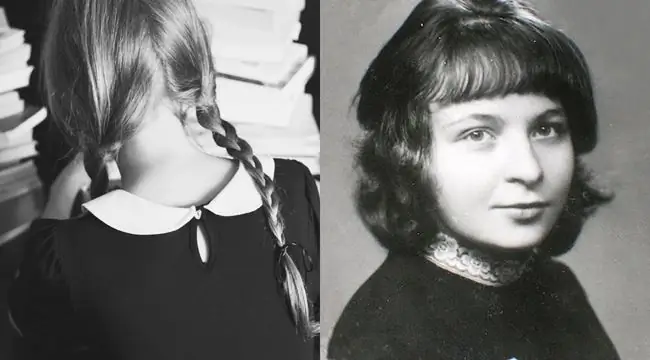
Marina finally got out of hand after the death of her mother. The Spartan way of life and the German discipline imposed by Maria Alexandrovna in the house kept the eldest daughter as if in captivity. And although it was a captivity of love, the girls adored their mother, Marina suffered beyond measure. Is it her temperament to sit for hours, learning scales and practicing ink! Mother, in her own image and likeness, created a pianist out of Marina, and did not attach much importance to the fact that a child from four years old “mumbles rhymes”. She even ridiculed her daughter's first timid poetic attempts in the family circle: “Fly, my zealous horse, take me there! Where to go? At that time the answer was not yet ripe with the Word:
A horse without restraint, Full sail! -
I'm going to tomorrow, To the land without forefathers, - will be written only after 15 years.
For Marina, the clicks of the metronome measuring the musical score were the most real torture. Tsvetaeva could not overcome her disgust for making music. But from the age of four she read perfectly. The Word became her salvation. Favorite from Pushkin at the age of six - "Eugene Onegin". The mother is angry again: what can a wayward child understand in Tatiana? Marina writes her first love letter just then, at the age of six, to her brother's tutor.
The store of visual love in her heart is inexhaustible. Little Marina constantly fell in love with a doll, a cat, a puppet dog, an actress, or a half-brother. It was the real love with fire in the "chest hole". She loved “being born and before being born”. Every time until the heart breaks, to physical pain. The mother's refusal to receive daughter's love was perceived as torment, and Maria Alexandrovna did not consider it necessary to demonstrate feelings, to caress her daughter once again, to praise her daughter. "I am my mother's eldest daughter, but not me beloved."
Die to see Nadia
Since childhood, Marina's rich visual imagination has endowed people close to her with fantastic properties. Her paternal elder sister, the beautiful Valeria, seemed to be a fairy or a witch. The gloomy "half-grandfather" Dmitry Ilovaisky is a monument to himself, Old Pimen. His daughter Nadia Marina adores, she seems to her beautiful, magical. "Nadya, alive, - chestnut and pink, all kind of burning velvet, like a peach in the sun, in her pomegranate cape."
Marina became close to Nadia and her brother Serezha in Italy, where they were treated for consumption, like her mother Maria Alexandrovna. Despite the significant difference in age, there is a close emotional connection between them. And suddenly, out of the blue, Nadya and Seryozha suddenly left for cold Russia. It seemed they were parting for a short while.
Marina refuses to believe in the news of the death of Seryozha and Nadia. 12-year-old Marina is literally delusional with Nadia, trying to see her everywhere. “Die to see Nadia” - that was how it was called, harder than two and two, firmly, like “Our Father,” so I would answer the question from my sleep: what do I want most. So what is next? Further - nothing - everything. See, see. Always look."
“I never saw Nadia, no matter how I cried out, no matter how I begged, no matter how I lay in wait - at all corridor turns, the turn of the giraffe's head for every imaginary noise, noise; no matter how she stood - a steadfast, rooted hound - still in the same clearing of our daily walk, while others were catching the ball; no matter how thieves it grew into the wall in the partition between the wardrobes, which I must pass by now; no matter how she peeped behind the favorable curtain of incense in a number of seven-hundred-year-old wooden foolish and sensible virgins and, even more insistently, jumping out of her own eyes - in promising curtains.
A year later, from the same consumption, Maria Alexandrovna dies painfully, like Nadya.
The severance of an emotional connection is a powerful blow to the mental, from which, in childhood, the main sensor of a child with a visual vector, vision, suffers.
Marina experienced one after another, these strong breaks became the natural reason for her myopia.
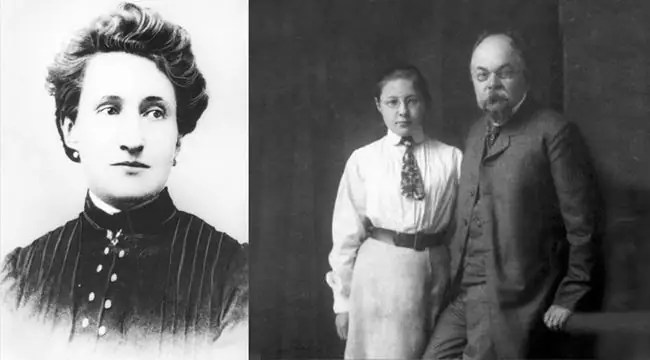
Dying, the mother bequeathed her children to live "according to truth." Marina of this truth - chains of prohibitions on impulses of the heart - could not and did not accept.
Freethinking and insolence earned Tsvetaeva notoriety in the gymnasium. The teachers were afraid to contact the obstinate student, from whom any trick could be expected. She dyed her hair straw, she cut her hair baldly and wore an ugly black cap. The father saw no way to influence his daughter and changed grammar schools. Despite the insolence, Marina studied well, in some subjects, for example, in history - brilliantly. What was interesting to her, she knew thoroughly, she could teach the lesson instead of the teacher, the schoolgirls listened to Marina with their mouths open.
To see people better than they are, to assume incredible qualities in others is an integral feature of Marina Tsvetaeva, the talent of her generous soul. There were disappointments, but even here on the part of Marina there was always: "Well, friends?" In the past she had no grudges, and she did not live in the past. Only forward to the future! By the age of 14, Marina's contradictory character was fully formed: a breakthrough of energy and Spartan habits, the desire to give love literally to the first comer and complete detachment from life events, audacity, all-consuming passion and mercy.
My business is treason, my name is Marina (M. Ts.)
In terms of Yuri Burlan's system-vector psychology, such a mental structure is determined by a combination of urethral, sound and visual vectors. The urethra and sound are dominants that do not mix with each other. They are the reason for the sudden change in human states, when unrestrained life is replaced by complete apathy, immersion in oneself, complete detachment from what is happening.
Passionate self-giving, frantic love for one's neighbor, the inability to exist without the environment, and immediately - the expulsion of everyone, withdrawal into loneliness, which is both a blessing and a curse. Good for creativity. Curse if creativity is not filled, pulling into a black hole, from where there is no return. In the rapid transitions from the urethra to sound and vice versa, the same "betrayal" from "change" is contained.
“It's humiliating to live without knowing why,” 15-year-old Tsvetaeva writes in a letter to her friend Pyotr Yurkevich. The thought of the girl-poet beats against the incomprehensibility of the meaning of being, and suddenly again a sharp rise to life, to earthly, passionate love. A minute - and the declaration of love for the "good boy" is ready, and in response the classic Onegin reprimand: "you took the risk of the first confession, the possibility of which did not occur to me" …
Different heads, different hearts, different speeds of life. Later, Yurkevich will come to his senses, will try to renew the relationship - wherever, Marina is already in a completely different life, a different state, where from the "good boy" Petya there is hardly a hint of memory. On the agenda is a completely different boy - a handsome "prince", fragile and sickly, destined for her by nature, an air knight, a pale, fatal non-resident who destroyed her. But that later, while they are completely happy.
And the green of my eyes, and the gold of my hair … (M. Ts.)
Marina's appearance is as changeable as her character. Tsvetaeva could seem now a slender beauty with golden hair and the eyes of a sorceress, now an disembodied "whip", now a sullen, ponderous girl whom stoop and myopia made her older than her years. The mental, immiscible, like water and oil, manifested itself in the body, changing it beyond recognition.
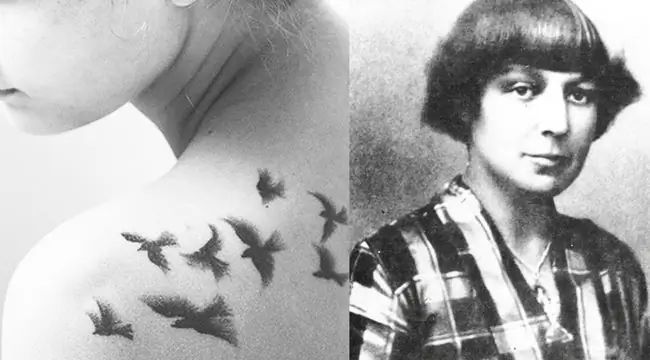
Photos are powerless. It is worth comparing them with the numerous descriptions of those who saw Marina and it is impossible to believe that the one depicted in the photo is the same as in the description of her sister, girlfriend, lover. Either "an Egyptian boy", now an amazingly feminine beauty, the gait is heavy, slow, now flying, inaudible. It is impossible to look away, how pretty she is, and here "the face is heavy, pale, indifferent", and then again "the page on the Vatican fresco."
The philosopher and art critic NA Yelenev describes Marina in an interesting way: “For me, the anatomical nature of Marina was and remains: her head was inspired, like the head of a thinker, expressing combinations of different centuries, cultures and nationalities. Hands … Such hands with hatred burned not only the landowners' estates, but also the old world. " Sound and urethral vectors in the flesh. Marina writes in 1906: "You can live without a family, without a" warm corner ", but how can one be reconciled that there will be no revolution?" And further: "With what delight I would have watched how our dear old house is burning!"
Against, against, against! (M. Ts.)
She was never in favor of the majority, which is "stupid, stupid and always wrong." To go “against paganism in the days of the first Christians, against Catholicism, when it became the dominant religion and vulgarized in the person of its greedy, depraved, base servants, against the republic for Napoleon, against Napoleon for the republic, against capitalism in the name of socialism … against socialism, when he will be implemented, against, against, against!"
And immediately after this, dreams that Moscow disappeared, and instead of it the summit of Elbrus, the loneliness of creativity, in order to immediately forget about meetings, cholera and cinematography … Loneliness is the curse of the urethra, a leader without a pack, a lone wolf, and at the same time delight in the sound that creates Word. Marina is extremely focused on the sound, she sits for hours in her room with a wolf's skin on the floor and a bust of Napoleon on the table. She writes.
Tsvetaeva does not regard revolution as a means to fill the hungry stomachs of the people. “Die for the Russian Constitution? Ha ha ha! Why the hell is she, a constitution, when I want the Promethean fire! Laws and restrictions are alien to the psychic essence of Marina, the urethral will over the cutaneous law. The revolution came in a different guise than the girl who was sick with Bonapartism imagined, but even in the darkest days of despair, hunger and loneliness, Marina was saved by poems that she wrote constantly - on scraps of wallpaper, on scraps of newspapers. When the poetry ended, life ended.
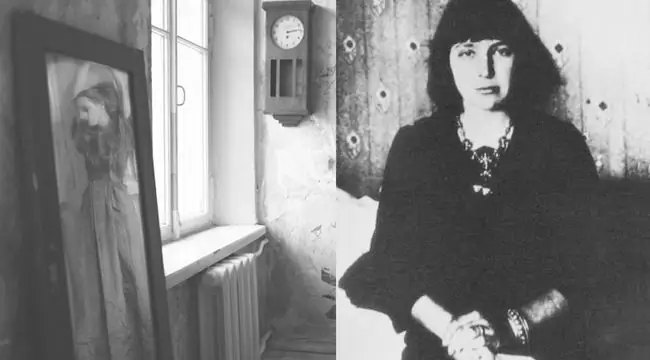
By 1908, revolutionary sentiments in Russia were in decline, there was a Nietzschean “reappraisal of values”, thoughts were dominated by “gender problems,” the emancipation of women and free love. Marina is sixteen, and the father is terrified of the possible prospects of his daughter's "free marriage". Attempts at edifying conversations only irritate the girl, all this heresy with emancipation could not have anything to do with the one whose passionate soul could not be curbed by any "constitutions" of morality. While the Vekh philosophy is maturing in Russia, Marina has a new love!
With Vladimir Nilender. Admirers of Tsvetaeva's creativity owe a bright, but fleeting romance with this man to the publication of the poet's first collection - "Evening Album". With a love letter to Nilender (There was, no, and will not be a replacement, / My boy, my happiness!) 18-year-old Marina Tsvetaeva enters literary life, nevertheless refuses to Vladimir's marriage proposal. The replacement for the "boy" is coming soon. In the meantime, fate is preparing for Tsvetaeva, perhaps the most amazing meeting - with the poet, translator, artist and literary critic M. A. Voloshin.
Apparition of the Sorcerer
Voloshin appeared at the house in Trekhprudny without an invitation. He could not help but come, the poems of the young Tsvetaeva struck him with their sincerity and at the same time maturity. Maximilian Alexandrovich did not separate the creator from the creation, so he came to get acquainted with the author. The uninvited guest stayed for five hours and became a friend, teacher and admirer of Marina's talent for life.
The first collection contains the whole Marina, passionate, contradictory, naive, who needs everything or nothing:
I want everything: with the soul of a gypsy
Go to the robbery songs,
To suffer for all to the sound of an organ
and an Amazon to rush into battle;
Fortune telling by the stars in the black tower
Lead the children forward through the shadow …
So that yesterday was a legend,
That was madness every day!
I love the cross, and silk and helmets,
My soul is a trace of moments …
You gave me childhood - better than a fairy tale
And give me death at seventeen!
At the time of Max's appearance, Marina was already sinking into sonic loneliness after breaking up with Nielander. She met Voloshin with a shaved bald head and a ridiculous cap. And suddenly, out of nowhere - fireworks of admiration for her, the poet! Voloshin opened a new stage in Tsvetaeva's life, introduced her to the literary circles of Moscow as an equal, as a new most valuable copy of his collection of talented people.
Marina leaves the gymnasium and goes to Voloshin in Koktebel to save herself from loneliness and book truths, which are tired of order. From an older friend she expects an answer to a question about the meaning of life, but the answer is not wise, not bookish. “I need a human response,” she writes in a letter to Max and receives an invitation to come.
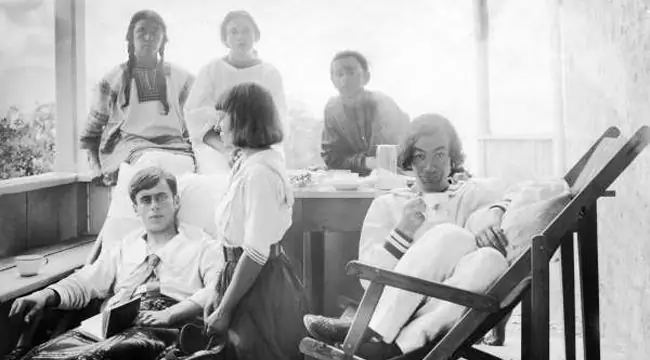
Reading in the soul of another person is the main talent of M. A. Voloshin. Visual love for people, a deep understanding of the feelings of others made this amazing person a center of attraction for a whole clan of summer residents who inhabited Voloshin's house in Koktebel. At various times, M. Gorky, O. Mandelstam, A. Green, N. Gumilyov, V. Bryusov, A. Bely, A. Tolstoy, K. Petrov-Vodkin, G. Neuhaus and many others stayed with him. And in May 1911 Marina Tsvetaeva arrived to find here, in a hospitable house on the seashore, her only earthly love for life. This was Voloshin's visionary answer to the unasked question about the meaning of life.
That is the fatigue of blue old blood … (M. Ts.)
“Until recently, I and the world were opposed, in Koktebel they merged,” Marina Tsvetaeva recalls about that time. Sound detachment, when you sit as if in a deep hole, and somewhere on the surface people live, is over. Accumulated "shameless desire to live, live, live." Marina breathes in deeply the salty sea air of urethral unlimited freedom. The world takes on flesh.
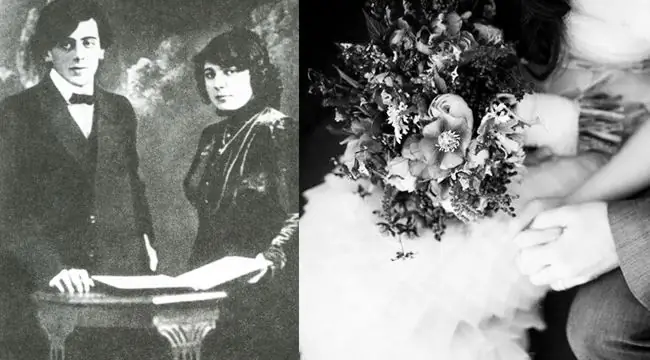
This flesh is beautiful and thin, with hands, as if from an old engraving, and eyes of the changeable color of the sea - "either green, or gray, or blue." This is how Marina herself describes Sergei Efron: “The face is unique and unforgettable under a wave of dark, with a dark golden tint, lush, thick hair. All the mind and all the nobility of the world are concentrated in the steep, high, dazzling white forehead, as in the eyes - all the sadness. And this voice is deep, soft, gentle, immediately captivating everyone. And his laughter is so cheerful, childish, irresistible! And the prince's gestures!"
Contrary to expectations, the entry is dated not 1911 to Koktebel's wondrous year of crazy love, but to 1914, Marina has been married for three years, her daughter is two years old. Tsvetaeva will carry her passionate love for her husband and faith in his exceptional nobility through the years of the Civil War and separation, through emigration, and upon returning to his homeland, she will not be afraid to defend Efron's innocence before Beria himself, the last one who did not doubt this innocence.
The "prince" was subject to all kinds of weakness. In photographs, he is often in pillows, in armchairs, clearly unwell. Next to the faithful guard in a sailor's suit is Marina. In this capacity, under the adored Seryozha, Marina Tsvetaeva will live for many years until their last and final separation. And then, in Koktebel, Efron was killed by the tragic death of his mother and brother, sick with tuberculosis, and merciful Marina decides “never, no matter what, not to part with him”. In January 1912, the wedding. “Marina is marrying Seryozha,” states M. Voloshin's mother, the majestic and categorical Elena Ottobaldovna. Max himself is vaguely concerned and alarmed by this marriage: "Both of you are too alive for such a deceitful form as marriage."
I have been a volunteer since day one (S. Efron)
In March 1915, Marina saw off an ambulance train at the station. Sergei Efron was serving for the front as a brother of mercy. He soon realizes that his place is on the front line, and not on an ambulance train. In a letter to his sister, Efron writes: "I know that I will be a fearless officer, that I will not be afraid of death at all." Marina did not need such assurances; she never doubted her husband.
Skin-visual men and now are not at the right time, they are like messengers from the future, waiting in the wings, adapting to a terrible world where all the same primitive oral cannibals, only slightly retouched by visual culture, rule the ball. What can we say about the beginning of the twentieth century, when the world first bared its teeth with a world war, and Russia was also civil.
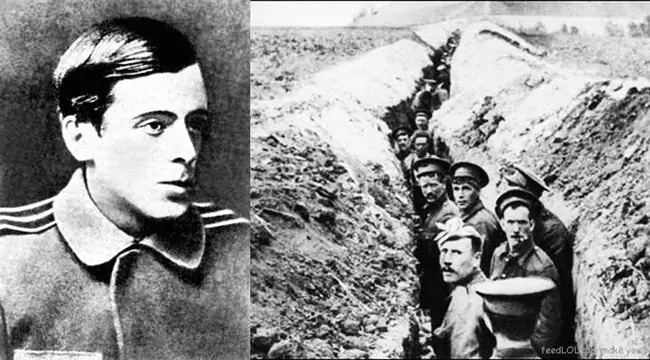
Did the skin-visual Sergei Efron have a chance to survive in such a meat grinder? It turns out he did. This chance was given to him by an urethral woman, a wife whom he served with quiet admiration, as the White movement, then Eurasianism and the Union of Return. Service was his skin, as he understood duty. Marina's support (she wrote every day), her unshakable confidence in his heroism gave Sergei Efron the strength to adapt to the role of a fearless warrior.
In the war, Sergei Efron remained himself, he did not shoot a single prisoner, but saved everyone he could from being shot, taking him to his machine-gun team. Such was Marina's chosen one, "the one who did not shoot." They shot him in their coveted homeland, in Soviet Russia, but Marina did not have time to find out about this: for her Sergei was alive, she tried to save her husband until the last day, and she kept the "Genoese carnelian bead" presented by Efron in happy Koktebel until her death. … More than twenty poems by Marina Tsvetaeva are dedicated to S. E., for example:
***
S. E.
I wear his ring defiantly
- Yes, in Eternity - a wife, not on paper.
His overly narrow face
Like a sword.
His mouth is silent, angles down,
Painful - eyebrows are great.
His face tragically merged
Two ancient bloods.
It is subtle by the first subtlety of the branches.
His eyes are beautifully useless! -
Under the wings of open eyebrows -
Two abysses.
In his face, I am faithful to chivalry.
- To all of you who lived and died without fear.
Such - in fateful times -
They compose stanzas - and go to the chopping block.
(1914)
Continuation:
Marina Tsvetaeva. The leader's passion is between power and mercy. Part 2
Marina Tsvetaeva. Snatching the older one out of the darkness, she didn’t save the younger. Part 3
Marina Tsvetaeva. I will win you back from all lands, from all heavens … Part 4
Marina Tsvetaeva. I would like to die, but I have to live for Moore. Part 5
Marina Tsvetaeva. My hour with you is over, my eternity remains with you. Part 6
Literature:
1) Irma Kudrova. The path of the comets. Book, St. Petersburg, 2007.
2) Tsvetaeva without gloss. Pavel Fokin's project. Amphora, St. Petersburg, 2008.
3) Marina Tsvetaeva. Captive spirit. Azbuka, St. Petersburg, 2000.
4) Marina Tsvetaeva. Books of poetry. Ellis-Lak, Moscow, 2000, 2006.
5) Marina Tsvetaeva. House near Old Pimen, electronic resource tsvetaeva.lit-info.ru/tsvetaeva/proza/dom-u-starogo-pimena.htm.






